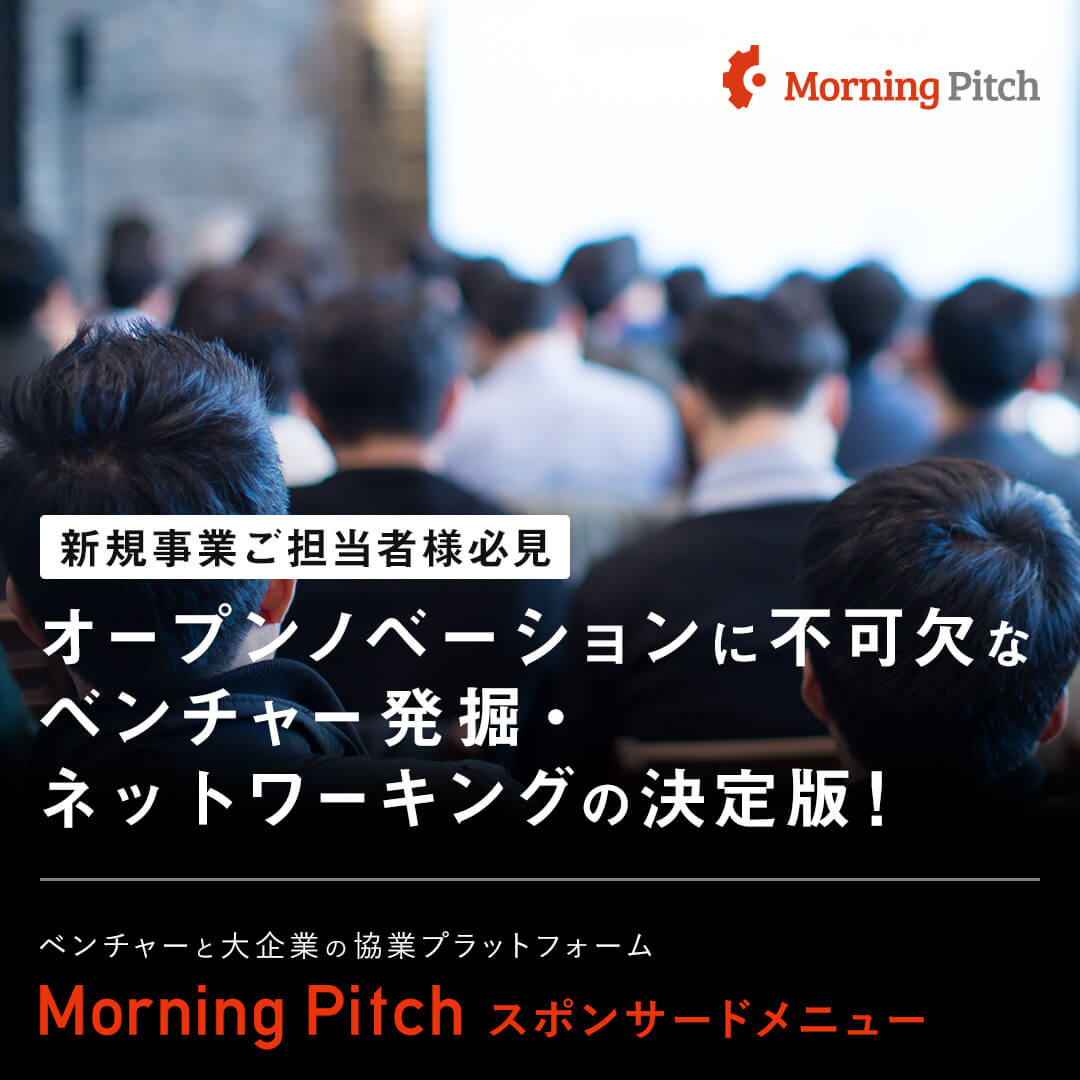イノベーショントレンド
【生成AI特集】先行する海外勢を日本発スタートアップが追い上げる。従業員や組織の生産性向上などニーズごとに大手企業との連携が進む
\イノベーショントレンド解説/
この連載ではモーニングピッチ各回で取り上げたテーマと登壇ベンチャーを紹介し、日本のイノベーションに資する情報を発信します。
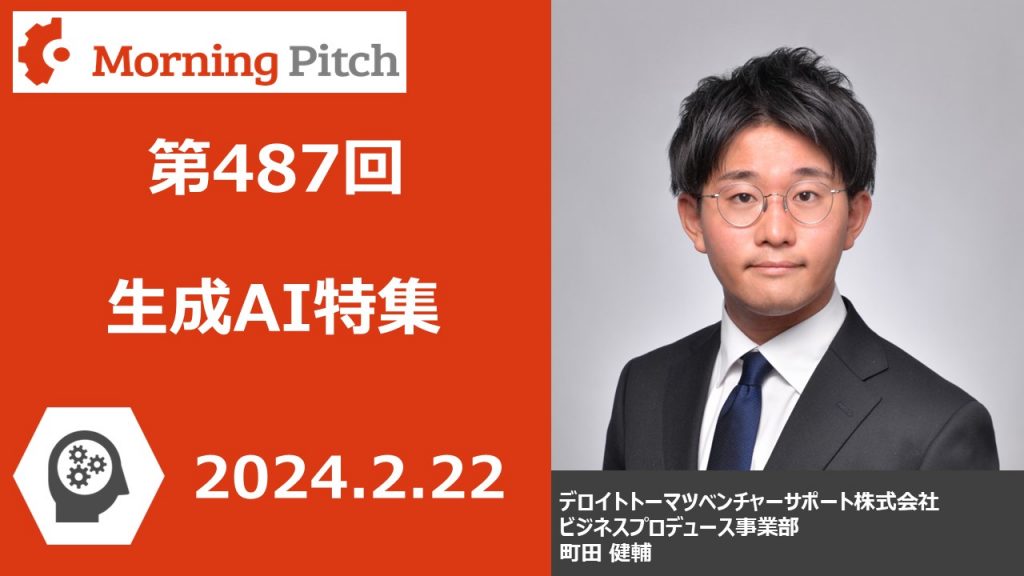
今回は、2月22日に開催した「生成AI特集」です。
グローバルの資金調達額は2023年から急激に上昇
生成AIは文章や画像・ソースコード等の生成を行うAIの総称です。データを学習し分析するだけの従来のAIと異なり、自然言語のほか多様な情報を理解・学習して幅広いタスクに対応、人間が生成したかのような自然なコンテンツを返します。一昨年まではテキストと画像がメインでしたが、2023年からは画像やソースコード、米オープンAI(OpenAI)の「Sora(ソラ)」に代表される動画など、多様な生成物に対応できるようになっています。
生成AI領域のグローバルにおける資金調達額を見ると、2023年に入り急激に上昇しました。スタートアップ向け市場が冷え込んだ中では注目された領域と言っていいでしょう。ただ、調達額全体の7割ぐらいをOpenAIや米インフレクションAI(Inflection AI)の大型調達が占め、市場の約8割はアーリーステージのスタートアップで構成されており、生成AIがどの領域で受け入れられるかを各社模索している段階です。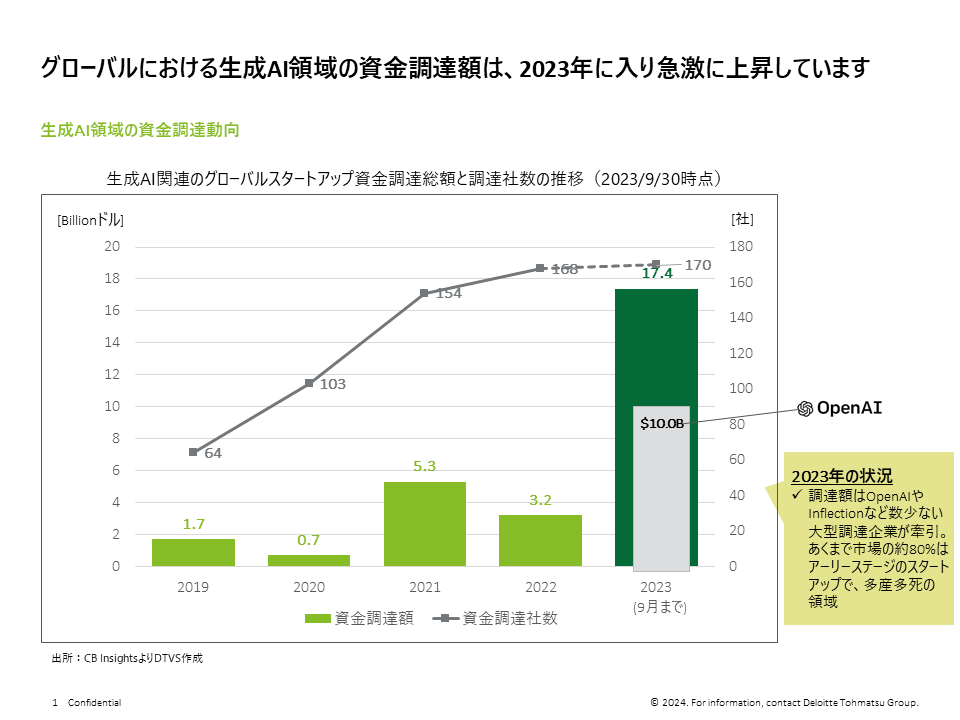
領域別でみると、AIアシスタントが群を抜いて資金を集めています。それ以外のユニコーン(企業価値が10億ドル超の未上場企業)が誕生するセクターでは、社内の生産性向上やマーケティングの効率化セールス、カスタマーサービスなど、導入効果が分かりやすい領域に資金が集まっている状況です。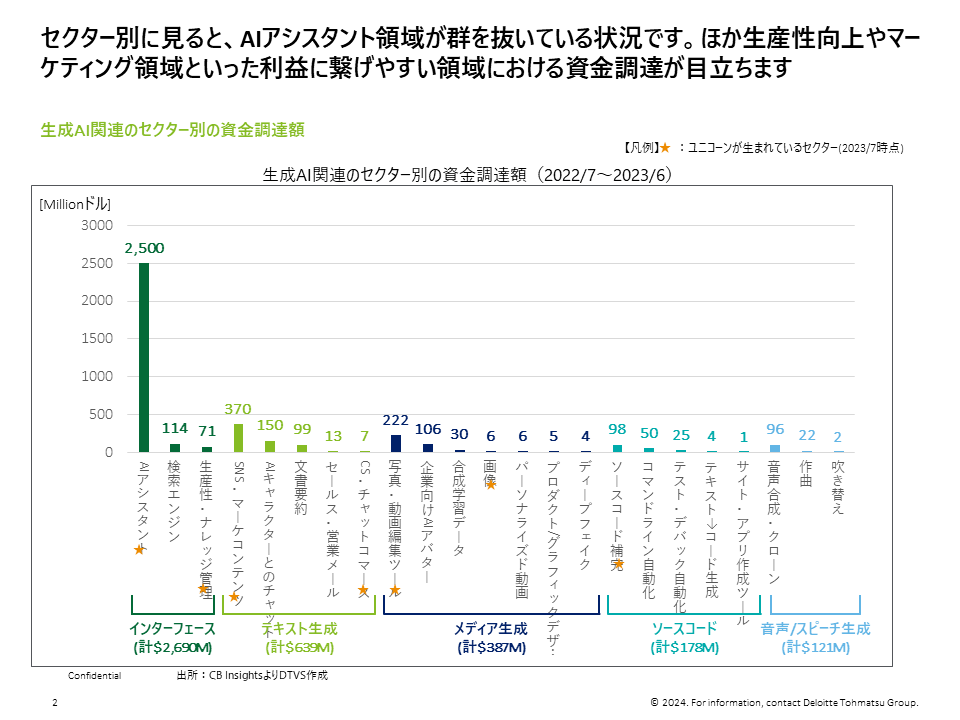
従業員や組織の生産性向上にかかわる分野で導入が加速
企業における生成AIの活用ニーズは、4つのケースに分類されます。最も導入が進んでいるのは、従業員や組織の生産性向上にかかわる分野です。二つ目は業務システムに生成AIを組み込んで、自動化と品質向上を図るケースです。三つ目が顧客接点の領域で、広告などにアバターの動画を使ったり体験づくりに活用したりするケースが、昨年辺りから増えていると感じています。四つ目が自社ドメインにおけるオーダーメイドによる大規模言語モデル(LLM)の開発で、建設や金融、製薬といった業界情報を読み込ましたLLMを、さまざまな新規事業やDX周辺の開発に活かしています。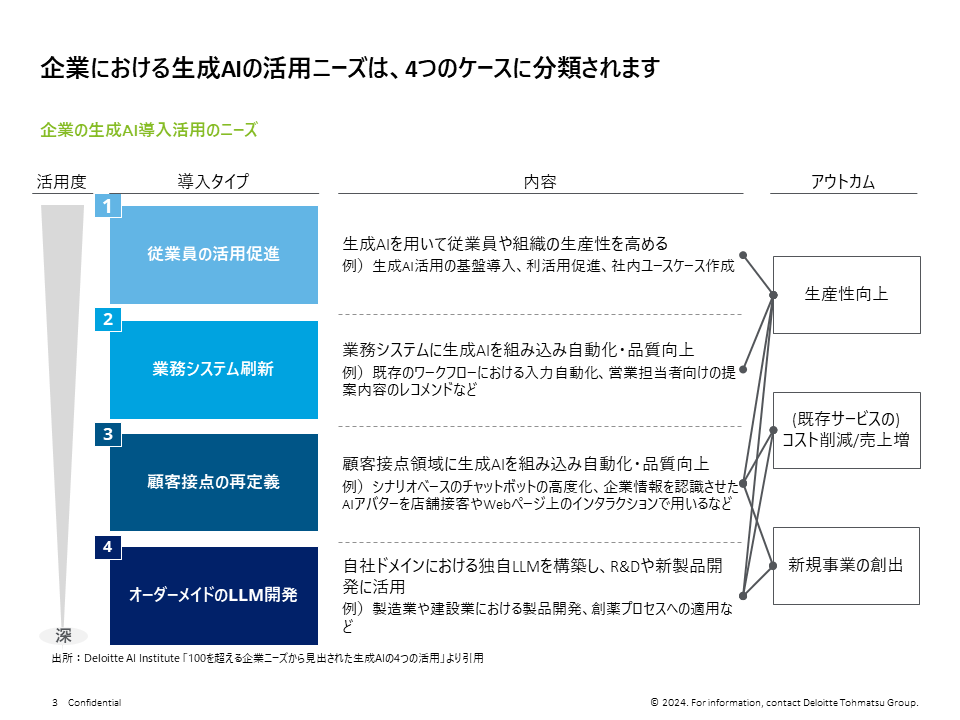
大手企業との連携が進む
大手企業が生成AIを活用、導入するにあたっては、スタートアップと連携するケースが顕在化しています。大手鉄道会社のカスタマーセンター機能を担う子会社は、東大発スタートアップのELYZA(イライザ)と組んで顧客対応業務の半自動化を行っています。生成AIが活躍するのは、1日あたり6000件にも及ぶ問い合わせへの対応案の作成だけではありません。社内向けの要望の要約作成まで一貫してAIが実施し、人は確認するだけの業務プロセスを確立しています。大手ゼネコンは、同じく東大発スタートアップの燈(あかり)と組んで、建築部材の情報を3次元モデルとひも付けるBIM(ビルディング・インフォメーション・モデリング)の有効活用を進めています。具体的には「3年前に実施した設備改修のコストはどの程度か」といった情報を自然言語で聞くことができる、建設業に特化したツールを開発しています。
国・地域ごとの規制状況を把握することが不可欠
生成AIを活用した新規事業を開発し、グローバル展開を視野に入れているのであれば、各国の規制の状況をとらえることが重要です。強いAI規制法を設けているのが欧州で、生成AIの提供企業にAI製であることを明示させるなど透明性の担保を求め、2026年から本格適用を開始します。中国はAIに用いたアルゴリズム開示を求め、ChatGPTなど外国製生成AIを実質的に排除しています。日本はまだしっかりした規制は確立されていないものの、2023年5月のG7広島サミットを機に、規制の議論が進んでいます。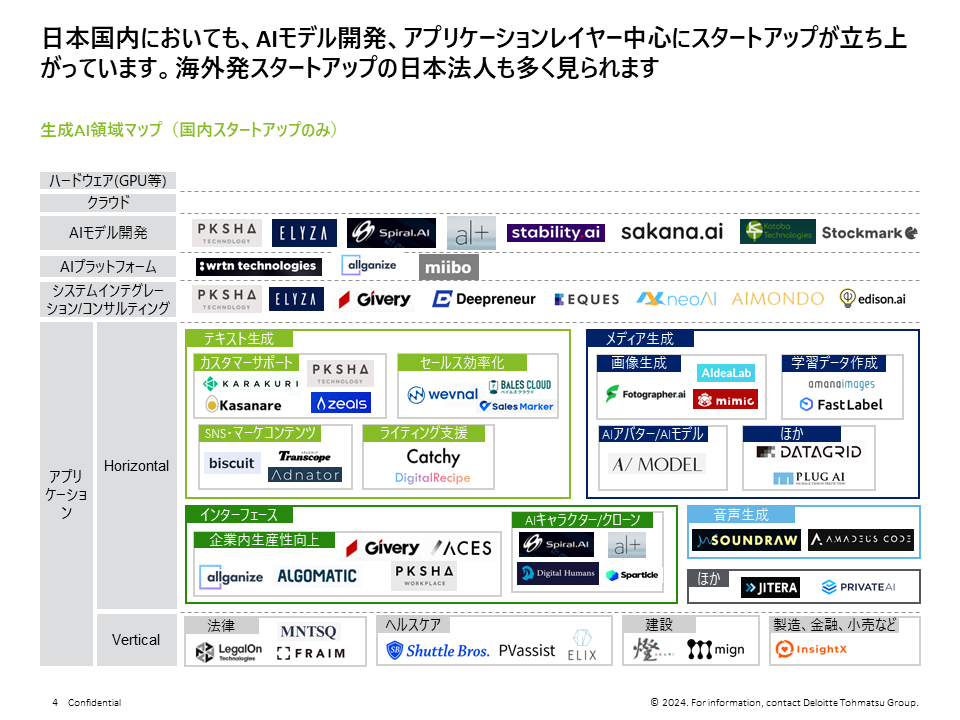
国内の生成AI関連スタートアップ市場は海外勢が大きく先行していますが、日本でもAIモデルの開発とアプリケーションレイヤーを中心にスタートアップが立ち上がっています。また、海外発のスタートアップが日本に拠点を構えて事業を推進するケースも多く、今回紹介する企業5社のうち3社は海外発になります。
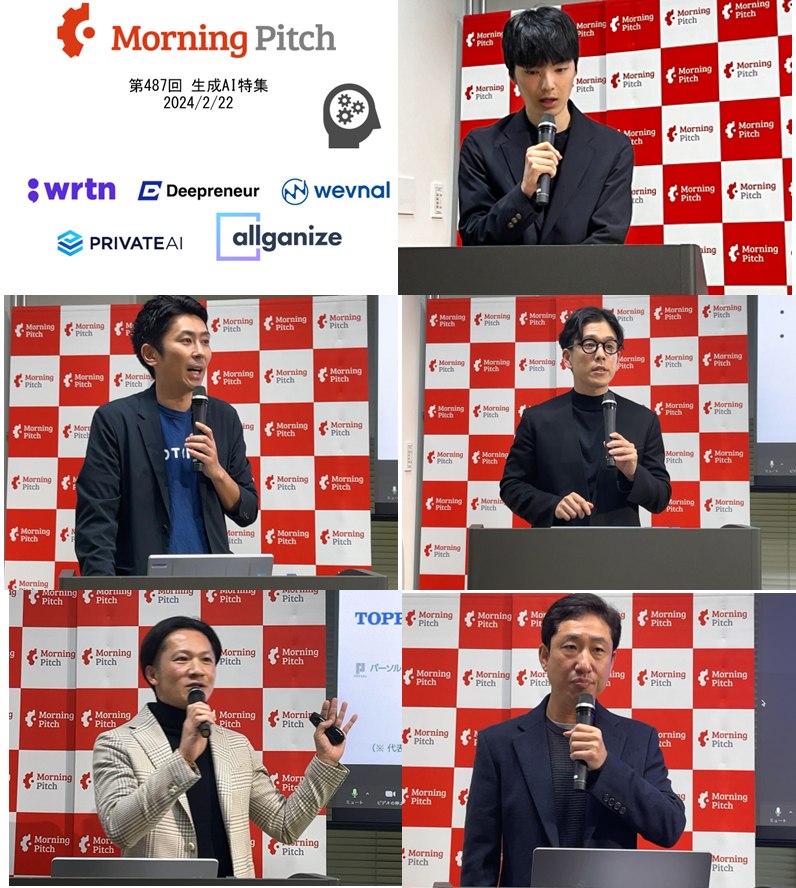
日本語特化型のLLMが日本語の評価指標で高い評価を受ける(株式会社Deepreneur)
Deepreneur(ディープレナー)は、東大松尾研究所の出身メンバーを中心としたエンジニア&研究者集団。大規模言語モデル(LLM)をはじめとする、生成AIを活用した法人向けDXソリューション事業を展開しています。独自の生成AI技術と大企業との共同研究実績を強みとしており、日本語特化型のLLMは日本語の評価指標「JGLUE(Jグルー)」において、ChatGPT3.5などを圧倒する性能を誇ります。今後は追加学習などの柔軟性のあるアーキテクチャーを活用したさらなるソリューションの一般化を進める計画です。
生成AIとチャットで行える顧客対応サービス(株式会社wevnal)
wevnal(ウェヴナル)は、生成AIとチャットで行える顧客対応サービス「BOTCHAN AI」を提供しています。見込み客から成約へと徐々に人数が絞り込まれるマーケティングファネルに対し、一気通貫で接客することによりCVR(コンバージョン率)を改善し、LTV(顧客生涯価値)を最大化できるのが特徴です。成果型報酬のため初期導入リスクが低く、現時点で600社以上の導入実績があります。今後は、Microsoftと連携を強化しながら24時間365日の自動対応、ユーザーの興味にあわせたパーソナライズ接客ができるようにします。
50を超える個人識別符号について日本語を含む52の多言語に処理(Private AI Inc.)
カナダ発ベンチャーであるPrivate AI Inc.(プライベートエーアイインク)は、世界トップクラスのアルゴリズムを活用した機械学習モデルで個人識別符号を識別、匿名化する技術を保有しています。50を超える個人識別符号について日本語を含む52の多言語に処理をすることが可能で、北米や欧州では既に政府機関、大企業での導入実績があります。マイナンバーや住所表記など、日本固有のデータタイプにも適応できるため、今後は日本市場でも、直販だけでなく積極的にパートナーシップモデルを展開する計画です。
直感的かつノーコードで生成AIを活用(Allganize Japan 株式会社)
シリコンバレー発のAllganize(オルガナイズ)Japanは、日米韓のグローバルAIソリューションカンパニーで、「自社データを生成AIとどう結び付ければよいかわからない」といった課題に対し、直感的かつノーコードで生成AIを活用できるサービスを提供しています。汎用的なシーンから特殊なものに至るまで、計100以上のユースケースに対応しており、ユーザーが特定のシーンを効率化する機能もノーコードで対応可能。誰でも使えるUXを追及・実現している点が、類似ツールとの大きな差です。
無料で使えて専門知識が不要なノーコードAIツール(株式会社リートンテクノロジーズジャパン)
韓国発スタートアップのリートンテクノロジーズジャパンは、無料で使えて専門知識が不要なノーコードAIツール「リートン・スタジオ」を提供しています。同サービスを用いることで自社のデータ・システムと連携し、必要な作業を行うAIエージェントを効率的に作成。低コストで生成AI技術を生産性の改善に適用することができます。初サービスをローンチしたのはChatGPTより1ヵ月早い2022年10月。その後、1年で200万人の累計ユーザー数を達成しており、日本市場でも急速に展開を進めています。
日本は少子高齢化が進んでおり、持続的な経済成長を実現するためにも生成AIを活用した生産性の向上は喫緊の課題です。生成AI領域で、日本発有力スタートアップのさらなる台頭に期待が高まります。
▼テーマリーダーProfile

デロイト トーマツ ベンチャーサポート株式会社
ビジネスプロデュース事業部
町田 健輔(まちだ けんすけ)
東京大学工学部卒。IT系スタートアップにてプロダクトマネージャーとして計3プロダクトを担当し、BtoCメディアのグロース、BtoB SaaS立ち上げ等に従事。現職では、生成AI領域を含め、主に大手企業様向けの新規事業開発にまつわる業務を担当。
~イノベーショントレンドを定期的にキャッチアップされたい方へ~
—————————————————————————————————————————————-
Morning Pitchでは、上記のような各回テーマ概観の解説を
資料や動画にして有料会員様限定でお届けしています
解説資料・・・Morning Pitch有料会員
解説動画・・・Morning Pitch Innovation Community(MPIC)会員
—————————————————————————————————————————————-

